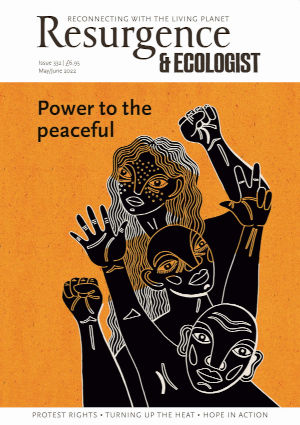Katharine Hayhoe is a distinguished climate scientist and a devout evangelical Christian. She is a Canadian national who lives and works in Texas, where she now serves as chief scientist for The Nature Conservancy, one of the world’s largest environmental organisations. She has a Twitter following of 210,000, and delivered a 2018 Ted Talk – ‘The most important thing you can do to fight climate change: talk about it’ – which has been viewed over 3.9 million times, and which forms the basis for her compelling and uplifting book Saving Us.
The premise is as simple as it is profound: the climate crisis is too urgent to fall foul of bipartisan division, in which (perhaps especially in the US) conservative political leanings can lead citizens to climate denial, even in the face of compelling scientific evidence, thereby denying climate action the widespread political support it so urgently needs. The answer: spend time with those with whom you disagree, listen to them respectfully, understand their underlying values and worldview, and then talk with them about the climate issue in ways that speak to them. More often than not it is possible to reach a shared understanding – and to convince people who might otherwise consider climate action a liberal conspiracy to act in favour of the climate on the basis of their own values and beliefs.
In addition to this fundamental, humanistic insight – the value (and bravery) of talking to others about climate change – Saving Us provides a well-structured and clear-sighted roadmap setting out what needs to happen. Here, Hayhoe writes with academic rigour as well as an admirable capacity for synthesis: this is a climate scientist with the ability to distil the scientific and policy literature for the benefit of the general reader. Case studies and illustrative examples – on renewable energy, transport, cities, Nature, the ocean and land use – abound. This is an excellent, up-to-date primer on the global climate crisis and the key ways forward.
The author’s deep faith is worn lightly: although referenced briefly throughout the book, and clearly helpful hinterland when engaging with faith and community groups, this is not a theological treatise grappling with the climate crisis from the perspective of a devout believer. Only one brief section explicitly addresses how Hayhoe’s two worlds – of private belief juxtaposed with public action in a largely secular setting – interact.
But perhaps, echoing the Book of Corinthians, the book’s quietly expressed faith underscores a more explicit focus on ‘hope’ and ‘love’. The hope is that human beings might yet act with the vision and moral courage needed to avert climate (as well as ecological) catastrophe, especially when their concerns have been acknowledged, and when they have been equipped with the arguments and evidence that they need. And the love is expressed through a belief in the best of human nature to act with wisdom and foresight, and for every human being on this Earth to be a force for good in addressing the climate crisis – irrespective of their political beliefs or broader worldview.
When I finished the book, I immediately resolved to spend more time with the ‘unconverted’, to do more in my personal life to act on climate, and to believe that we might still have the chance to steer this ship to a safe harbour. Hayhoe is one of the world’s most accomplished communicators on climate, and the fact that this book and its message have landed so well and with such a broad audience is itself a cause of hope. Saving Us remains a real prospect, especially if we move fast and with unprecedented determination, and Hayhoe will have played her full part if we do.






